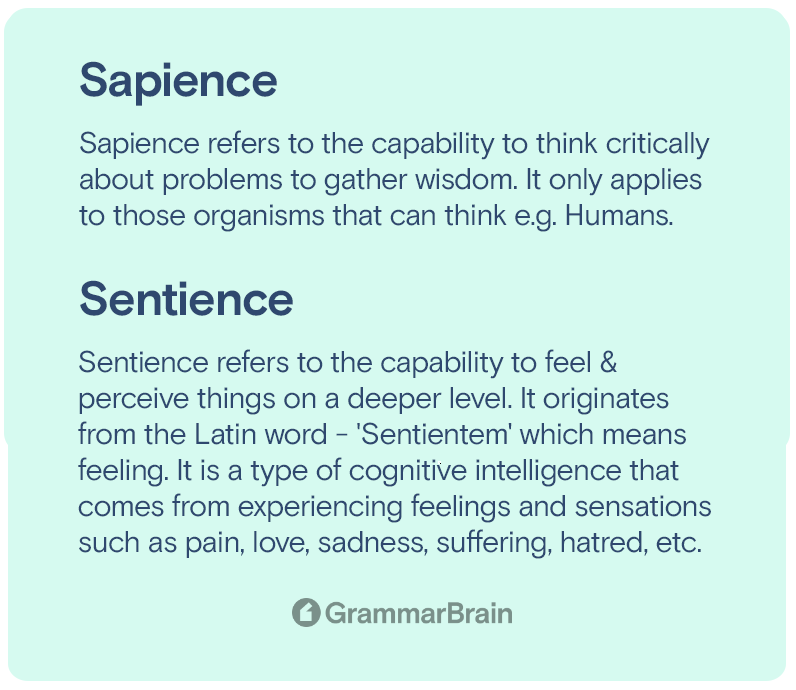What does sentience mean? And what does sapience mean? How are these two words similar? And how are they different? If you’re curious about the difference between sentience vs. sapience, continue reading this short grammar guide.
Using the two terms correctly (Sentience vs Sapience)
Sentience and sapience are two of the most confusing terms out there. Examining their differences along with their origin would help us use these two words properly in sentences.
In short, the main difference between sentience and sapience is the form of intelligence developed by the person. Sentience is a form of intelligence developed through sensory and emotional reception, while Sapience is a form of intelligence developed through knowledge and good judgment.

What is Sentience?
Sentience refers to the capability to feel & perceive things on a deeper level. It originates from the Latin word – ‘Sentientem‘ which means feeling. It is a type of cognitive intelligence that comes from experiencing feelings and sensations such as pain, love, sadness, suffering, hatred, etc. In this case, personal experience, culture & history plays a big role. Sentience manifests itself through a person’s self-awareness.
Animal behavioralists measure sentience by understanding ethical rules that govern animal societies. Psychologists have strong evidence that morality in animals stems from the sentient intelligence of the being.
What is Sapience?
Sapience refers to the capability to think critically about problems to gather wisdom. It only applies to those organisms that can think e.g. Humans. The word – ‘Sapience’ originates from the Latin term – ‘Sapientia’ which means intelligence.
So, sapient intelligence comes from practical understanding & common sense. A person’s sapience is dependent on his level of education, exposure to experiences, innate cognitive potential (memory) as well as aided cognition through technology.
It is mainly responsible for five characteristics:
- Problem-solving through self-knowledge
- Contextual understanding advantages & disadvantages
- Value or tradition-based actions
- Capacity for tolerance, and
- Capacity for empathy
So, sapient intelligence is highly influenced by active brain processing and usually decreases with age.
Similarities between sentience & sapience
- Both terms are related to intelligence.
- They are also dependent on a person’s behavior.
- Both are influenced by brain activity.
- A person’s mental stability is related to both sentience & sapience.
- Both play a vital role in balancing relationships between people.
- A person has to depend on both to get accepted by his community.
- Both are influenced by natural selection or evolution.
Differences between sentience & sapience
- Sentience is dependent on feelings, emotions & sensations, while sapience is dependent on knowledge, wisdom, education & exposure.
- The effect of knowledge and education is minimal in the case of sentience while, sapience is highly dependent on them.
- The effect of exposure is comparatively much less on sentience while in the case of sapience it plays a major role.
- Emotions affect the level of sentience to a great extent while it does not influence sapience to a large extent.
- A sentient organism does have consciousness and the capacity for sensing and feeling. But, it does not necessarily have sapience as it requires a higher level of brain function i.e. self-awareness.
- For example, a dog is sentient as it can feel, emote & sense stimuli. However, it is not sapient as it does not have self-awareness. On the other hand, a human being is both sentient and sapient.
Conclusion
Even though both words are used interchangeably, they differ quite a lot. How an organism responds to a certain stimulus can strongly determine whether it is sentient or sapient. Sentient organisms are conscious but not necessarily self-aware. On the other hand, a sapient being is also sentient.
Inside this article
Fact checked:
Content is rigorously reviewed by a team of qualified and experienced fact checkers. Fact checkers review articles for factual accuracy, relevance, and timeliness. Learn more.
Core lessons
Glossary
- Abstract Noun
- Accusative Case
- Anecdote
- Antonym
- Active Sentence
- Adverb
- Adjective
- Allegory
- Alliteration
- Adjective Clause
- Adjective Phrase
- Ampersand
- Anastrophe
- Adverbial Clause
- Appositive Phrase
- Clause
- Compound Adjective
- Complex Sentence
- Compound Words
- Compound Predicate
- Common Noun
- Comparative Adjective
- Comparative and Superlative
- Compound Noun
- Compound Subject
- Compound Sentence
- Copular Verb
- Collective Noun
- Colloquialism
- Conciseness
- Consonance
- Conditional
- Concrete Noun
- Conjunction
- Conjugation
- Conditional Sentence
- Comma Splice
- Correlative Conjunction
- Coordinating Conjunction
- Coordinate Adjective
- Cumulative Adjective
- Dative Case
- Determiner
- Declarative Sentence
- Declarative Statement
- Direct Object Pronoun
- Direct Object
- Diction
- Diphthong
- Dangling Modifier
- Demonstrative Pronoun
- Demonstrative Adjective
- Direct Characterization
- Definite Article
- Doublespeak
- False Dilemma Fallacy
- Future Perfect Progressive
- Future Simple
- Future Perfect Continuous
- Future Perfect
- First Conditional
- Irregular Adjective
- Irregular Verb
- Imperative Sentence
- Indefinite Article
- Intransitive Verb
- Introductory Phrase
- Indefinite Pronoun
- Indirect Characterization
- Interrogative Sentence
- Intensive Pronoun
- Inanimate Object
- Indefinite Tense
- Infinitive Phrase
- Interjection
- Intensifier
- Infinitive
- Indicative Mood
- Participle
- Parallelism
- Prepositional Phrase
- Past Simple Tense
- Past Continuous Tense
- Past Perfect Tense
- Past Progressive Tense
- Present Simple Tense
- Present Perfect Tense
- Personal Pronoun
- Personification
- Persuasive Writing
- Parallel Structure
- Phrasal Verb
- Predicate Adjective
- Predicate Nominative
- Phonetic Language
- Plural Noun
- Punctuation
- Punctuation Marks
- Preposition
- Preposition of Place
- Parts of Speech
- Possessive Adjective
- Possessive Determiner
- Possessive Case
- Possessive Noun
- Proper Adjective
- Proper Noun
- Present Participle
- Prefix
- Predicate



